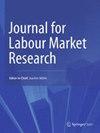Determinants of overlapping mismatch in the Turkish labour market
IF 1.6
Q2 INDUSTRIAL RELATIONS & LABOR
引用次数: 0
Abstract
Abstract Using a micro dataset from labour force survey of Turkey and employing a multinomial logistic regression, this paper examines the determinants of mere overeducation, mere field of study mismatch and full-mismatch (who are both overeducated and field of study mismatched simultaneously). The target group consists of full-time wage-based employees who graduated from higher education and are aged 20–65. The determinants of mismatch are analysed under four variable groups which are labour market context, demography, field of study and job-specific characteristics. In line with the earlier empirical evidence, we find that the unfavourable economic conditions at the time of entry into the labour market might affect the behavioural pattern of individuals while searching for a matching job. Moreover, the sharp increase in university graduates increased further the fierce competition for the limited jobs available in the labour market, and resulted in a high likelihood of mismatch especially for the recent graduates. In sum, the estimation results yield that any mismatch category is responsive to those determinants where fully-mismatched employees are more responsive. Hence, we propose that the policy implications should better focus on the full-mismatch category.土耳其劳动力市场重叠错配的决定因素
摘要:本文利用土耳其劳动力调查的微观数据集,采用多项逻辑回归,研究了单纯过度教育,单纯学习领域不匹配和完全不匹配的决定因素(同时受教育过度和学习领域不匹配)。目标群体是年龄在20-65岁的受过高等教育的全职领薪员工。错配的决定因素在四个变量组下进行分析,这四个变量组是劳动力市场背景,人口统计,研究领域和工作特定特征。与先前的经验证据一致,我们发现进入劳动力市场时的不利经济条件可能会影响个人在寻找匹配工作时的行为模式。此外,大学毕业生的急剧增加进一步加剧了劳动力市场上有限工作的激烈竞争,并导致了高度不匹配的可能性,特别是对应届毕业生。总之,估计结果表明,任何不匹配的类别都对那些完全不匹配的员工更敏感的决定因素有反应。因此,我们建议政策建议应更好地关注完全不匹配类别。
本文章由计算机程序翻译,如有差异,请以英文原文为准。
求助全文
约1分钟内获得全文
求助全文
来源期刊

Journal for Labour Market Research
INDUSTRIAL RELATIONS & LABOR-
CiteScore
2.60
自引率
5.90%
发文量
17
审稿时长
15 weeks
期刊介绍:
The Journal for Labour Market Research is a journal in the interdisciplinary field of labour market research. As of 2016 the Journal publishes Open Access. The journal follows international research standards and strives for international visibility. With its empirical and multidisciplinary orientation, the journal publishes papers in English language concerning the labour market, employment, education / training and careers. Papers dealing with country-specific labour market aspects are suitable if they adopt an innovative approach and address a topic of interest to a wider international audience. The journal is distinct from most others in the field, as it provides a platform for contributions from a broad range of academic disciplines. The editors encourage replication studies, as well as studies based on international comparisons. Accordingly, authors are expected to make their empirical data available to readers who might wish to replicate a published work on request. Submitted papers, who have passed a prescreening process by the editors, are generally reviewed by two peer reviewers, who remain anonymous for the author. In addition to the regular issues, special issues covering selected topics are published at least once a year. As of April 2015 the Journal for Labour Market Research has a "No Revisions" option for submissions (see ‘Instructions for Authors’).
 求助内容:
求助内容: 应助结果提醒方式:
应助结果提醒方式:


